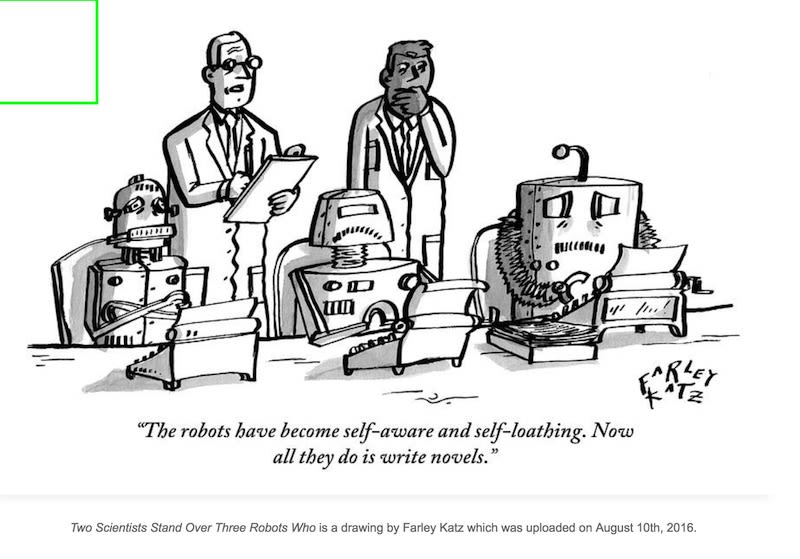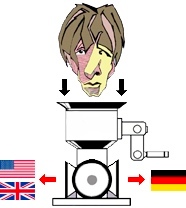| Stron w wątku: [1 2] > | Fascinating human mind, language and translation Autor wątku: Jean Dimitriadis
|
|---|
Judging from the innumerable threads and articles touching upon MT, MTPE and AI (or even this and that tool) over the years, there is a certain collective fascination with the capabilities, possibilities, ramifications and quite frankly with the "magic" of computers, software, neural networks, machine/automatic translators, robotic intelligence, and whatnot.
Yet, in the midst of such unfoldings and of a growing expectation that translation is among the professions with a high degree... See more Judging from the innumerable threads and articles touching upon MT, MTPE and AI (or even this and that tool) over the years, there is a certain collective fascination with the capabilities, possibilities, ramifications and quite frankly with the "magic" of computers, software, neural networks, machine/automatic translators, robotic intelligence, and whatnot.
Yet, in the midst of such unfoldings and of a growing expectation that translation is among the professions with a high degree of exposure to these technologies (exposure not meaning replacement but Impacting a significant part of the job), I feel we're missing threads that focus on and discuss another kind of magic that's still going on.
The beauty of human mind, the wonder of natural language(s), culture and communication, the passing and transformations that wizards-translators and interprets operate from one tongue to another, the fascinating feats and mastery of craftsmen and craftswomen and the sheer word magic at work.
Let this be a thread that invites to be attentive to, share and celebrate everyday or out of the ordinary encounters with such delicacies or even our own little or grand epiphanies as language artisans.
Note: Let's not delve into pitting/comparing human against machine, there's a myriad of other threads for that.
Also, when I say human, I don't mean to express opposition or superiority to the rest of the animate world, the greater web of life in which we participate.
[Edited at 2023-03-24 20:37 GMT] ▲ Collapse
| | | | Tom in London
Wielka Brytania
Local time: 03:23
Członek ProZ.com
od 2008
włoski > angielski
| Excellent post | Mar 24, 2023 |
Brilliant. Jean
| | | | Dan Lucas 
Wielka Brytania
Local time: 03:23
Członek ProZ.com
od 2014
japoński > angielski
| What will survive? The irreducibly human | Mar 24, 2023 |
Jean Dimitriadis wrote:
Note: Let's not delve into pitting/comparing human against machine, there's a myriad of other threads for that.
Indeed, perhaps machines will outdo us in translation one day in a distant or not-so-distant future, but that could surely apply to almost any field of human endeavour.
And if the day does come when machines are able to carry out every mundane function more quickly, more reliably and more efficiently than humankind, then the last refuge for our sense of self - and perhaps our last remaining concern - may be those services and rituals that only humans can perform for each other, achieved through touch, presence, and soul. Not such a bad outcome, I think.
Larkin's emphatic "What will survive of us is love" - a shockingly upbeat conclusion from so gloomy a poet - could turn out to be a greater prophesy for mankind than he understood.
Dan
| | | | Matthias Brombach 
Niemcy
Local time: 04:23
Członek ProZ.com
od 2007
niderlandzki > niemiecki
+ ...
Whenever I hear comments on AI from friends, relatives and colleagues, all of them absolute amateurs in our business, when complaining to them about my special situation as a freelancer because of the market situation due to DeepL and other AI based systems, I hear a level of admiration in their words for those systems that is not justified. As if these systems represent a level of intelligence which doesn't only come near to the power of the human mind but already to that of a higher being, lik... See more Whenever I hear comments on AI from friends, relatives and colleagues, all of them absolute amateurs in our business, when complaining to them about my special situation as a freelancer because of the market situation due to DeepL and other AI based systems, I hear a level of admiration in their words for those systems that is not justified. As if these systems represent a level of intelligence which doesn't only come near to the power of the human mind but already to that of a higher being, like a God. Systems, that not only are able to translate flawless, but also to write texts. It is often hard to make them understand, that these systems are all human made and therefore can be in error. Isn't it amazing how people can be deceived in their minds by nearly perfect linguistics outputs? ▲ Collapse
| | |
|
|
|
Philip Lees 
Grecja
Local time: 05:23
grecki > angielski
| More than words | Mar 25, 2023 |
Jean Dimitriadis wrote:
... the wonder of natural language(s), culture and communication, the passing and transformations that wizards-translators and interprets operate from one tongue to another, the fascinating feats and mastery of craftsmen and craftswomen and the sheer word magic at work.
There used to be a school of thought that maintained that all thought is just language. In other words, that when we think we're thinking, all we're really doing is manipulating words and expressions according to a set of rules.
But the work we do as translators every day disproves this hypothesis. For example, if I translate the Greek expression "Τον έπιασαν στα πράσα" as "He was caught red-handed", that is a correct translation, even though the Greek source contains no reference to a hand, or to the colour red, and is in the active voice as opposed to the passive used in the translation.
So somewhere there is a semantic overlap that is independent of the words themselves. What mathematicians and logicians call the "intersection" of two or more entities (A∩B). It is in this region, the ineffable world of concepts, that we translators operate. And of course it's not just English and Greek: it's the common ground, the intersection, of the same concept expressed in all possible human languages.
I think there's definitely something magical about that.
| | | | P.L.F. Persio 
Holandia
Local time: 04:23
angielski > włoski
+ ...
| The irreducibly human – 2 | Mar 25, 2023 |
From The New Yorker

[Edited at 2023-03-25 08:01 GMT]
[Edited at 2023-03-25 08:21 GMT]
| | | | P.L.F. Persio 
Holandia
Local time: 04:23
angielski > włoski
+ ...
| The irreducibly human – 3 | Mar 25, 2023 |
Dan, I've shamelessly appropriated part of your title, but it's brilliant, so thank you very much indeed. I'm also grateful to you for Larkin's jewel of a poem.
Another corker from The New Yorker, a recent article and a great read:
Nicholas Humphrey’s Beautiful Theory of Mind
"In his new book, “Sentience,” a neuropsychologist argues that consciousness evolved to make us feel that life is worth living.... See more Dan, I've shamelessly appropriated part of your title, but it's brilliant, so thank you very much indeed. I'm also grateful to you for Larkin's jewel of a poem.
Another corker from The New Yorker, a recent article and a great read:
Nicholas Humphrey’s Beautiful Theory of Mind
"In his new book, “Sentience,” a neuropsychologist argues that consciousness evolved to make us feel that life is worth living."
https://www.newyorker.com/news/annals-of-inquiry/nicholas-humphreys-beautiful-theory-of-mind?utm_source=nl&utm_brand=tny&utm_mailing=TNY_Classics_Sunday_HEU_031923&utm_campaign=aud-dev&utm_medium=email&bxid=637511730abe27ddeb06129f&cndid=71696246&hasha=8973b7ee4f2c0bb453dcbd2f5c4fd7f1&hashb=f5eddc7933b8e702dca5a57cb9f7c46b04839448&hashc=728dc72323ce304b303bc25092c9b8b50f700a70d50988f477d186c346644227&esrc=&mbid=mbid=CRMNYR012019&utm_term=TNY_Classics
"In the nineteenth century, the biologist Thomas Henry Huxley had compared consciousness to the whistle of a train or the chiming of a clock. According to this view, known as epiphenomenalism, consciousness is just a side effect of a system that works without it—it accompanies, but doesn’t affect, the flow of neural events.
(...) In more than half a dozen books over the past four decades, Humphrey has argued that consciousness isn’t just the whistle on the train but part of its engine. In his view, our ability to have conscious experiences shapes our motives and psychology in ways that are evolutionarily advantageous. Sensations motivate us in an obvious way: wounds feel bad, orgasms feel good. But they also make possible a set of sensation-seeking activities—play, exploration, imagination—that have helped us to learn more about ourselves and to thrive.
And they make us better social psychologists, because they allow us to grasp the feelings and motives of other people by consulting our own. “The more mysterious and unworldly the qualities of phenomenal consciousness”—the felt sensations of properties such as color, smell, and sound—“the more significant the self,” he writes. “And the more significant the self, the greater the value that people will have placed on their own—and others’—lives.”
(...) More broadly, Humphrey’s views on consciousness subtly challenge many current ideas. The startling performance of software programs like ChatGPT has convinced some observers that machine consciousness is imminent; recently, a law in the U.K. recognized many animals, including crabs and lobsters, as sentient.
From Humphrey’s point of view, these attitudes are misguided. Artificially intelligent machines are all perception, no sensation; they’ll never be sentient so long as they only process information. And animals such as reptiles and insects, which face little evolutionary pressure to develop a grasp of other minds, are also very unlikely to be sentient. If we don’t understand what sentience is for, we’re likely to see it everywhere. Conversely, once we perceive its practical value, we’ll acknowledge its rarity." ▲ Collapse
| | | | Frank Wong 
Local time: 11:23
chiński > angielski
+ ...
| unique in many things | Mar 27, 2023 |
Human mind is an extremely complex mix of emotions, sensations, feelings as well as reason and logic. My thought is that inventions and innovations achieved by mankind were driven and initiated by emotions and sensations, then implemented and built through logic. People invented motorized vehicles when they got exhausted pulling a cart, invented telephone when they were tired of waiting or too worried to wait days or months for their mails to be delivered. People may say something sarcastic when... See more Human mind is an extremely complex mix of emotions, sensations, feelings as well as reason and logic. My thought is that inventions and innovations achieved by mankind were driven and initiated by emotions and sensations, then implemented and built through logic. People invented motorized vehicles when they got exhausted pulling a cart, invented telephone when they were tired of waiting or too worried to wait days or months for their mails to be delivered. People may say something sarcastic when they are being funny or feeling bitter or jealous. Fictional characters and novels are created and enjoyed by many because of the boredom of everyday life. This can go on and on. Though human mind is incompetent in terms of memorizing, fetching, processing information, we are unique in dynamism, compassion, curiosity, kindness, passion, arrogance, ego, selfishness, ability to feel joy, pain, motivated, sorrow, loneliness, pride etc. All of these make us perfectly imperfect for creation and innovation. I was wondering if we could ever be able to create AIs that think, perceive, feel like us. If so, we could then sit back, leaving all our work to them. But, there would be a paradox. Isn't it inhuman to make AI work 24 hours for us for free if they were emotional and sensational creatures like us? Shouldn't they be respected and treated as living intelligent beings instead of machines? ▲ Collapse
| | |
|
|
|
| | Denis Fesik
Local time: 06:23
angielski > rosyjski
+ ...
A YouTube lecture on neuroscience. "A neuron is basically a capacitor. It charges, charges, charges, and then fires when the charge reaches a certain level. A completely mechanical process. Got it, kids? Okay, now here are mirror neurons. They don't know the difference between self and other..." I say, "Wait, how? In terms of the capacitor thing?" No answer given. I stop watching. I seriously can't understand how you can still be fascinated by human mind if you hold a post-(post-post-post...)-mo... See more A YouTube lecture on neuroscience. "A neuron is basically a capacitor. It charges, charges, charges, and then fires when the charge reaches a certain level. A completely mechanical process. Got it, kids? Okay, now here are mirror neurons. They don't know the difference between self and other..." I say, "Wait, how? In terms of the capacitor thing?" No answer given. I stop watching. I seriously can't understand how you can still be fascinated by human mind if you hold a post-(post-post-post...)-modernist belief system. Is it just the complexity that fascinates? Quantity transformed into quality? Anyway, the only reason why I can afford to be so fascinated is because my belief system is different ▲ Collapse
| | | | | Keep'em coming | Mar 27, 2023 |
Thank you all so far for such rich and diverse contributions to this thread.
So many interesting points are being raised/touched upon.
I reserve some comments for later, but let's keep the discussion going (and on topic)!
| | | | | Mother Machine vs. Mother Nature | Mar 30, 2023 |
Dear Jean,
I wholeheartedly thank you for this outstanding piece of prose - which would have earned to be ranked as a poem.
Your words sound like a booster jab for all of us, reminding us as poor little human beings not to forget the core values and principles of our beloved profession.
Your message - set aside its humanitic profound meaning - also reminds us that we all are a bridge as translators, whether a tiny narrow footbridge or a huge stately viaduct... See more Dear Jean,
I wholeheartedly thank you for this outstanding piece of prose - which would have earned to be ranked as a poem.
Your words sound like a booster jab for all of us, reminding us as poor little human beings not to forget the core values and principles of our beloved profession.
Your message - set aside its humanitic profound meaning - also reminds us that we all are a bridge as translators, whether a tiny narrow footbridge or a huge stately viaduct, but a bridge all the same between two persons, or two families or two people from different countries and origins who wouldn't have got any single chance to meet each other nor to make them understand, let alone building real cemented bridges all together... (I refer to the story of the Channel Tunnel also called Eurotunnel.)
There is one last thing your message inspires me: Never any computer, software, neuronal network, machine/automatic translator, robotic intelligence and the all bag of tricks would be able to replace any human being as long as those gizmos will be incapable of achieving the best foolish actions as well as the worst ones, basically acting like a human being. One thing's for sure - at least for the time being: The machine is still by far too perfect to have a sustainable existence on Earth. Simply because Mother Nature isn't so perfect by herself (I mean She's often dissymmetrical, mostly unfair as She ignores human or animal rights, and on top of that ruthless with her own creations).
But the day the machine will be capable of true and inconditional love, as well as commiting murder or simply killing itself on a whim - basically acting fully as a human being - then it will be time to wonder whether Mother Nature hasn't just simply been replaced by Mother Machine overnight... I shudder to think of such a living nightmare...
Greetings.
[Modifié le 2023-04-03 14:07 GMT] ▲ Collapse
| | |
|
|
|
| I couldn't agree more with your sentiment | May 15, 2023 |
I couldn't agree more with your sentiment about the core values and principles of our beloved profession. As translators, we have the incredible privilege of being bridges between people, families, and cultures. Whether we're connecting individuals from different countries or helping to build understanding, our role as translators is essential. Just like bridges, we come in all shapes and sizes, but our purpose remains the same: to facilitate communication and foster connections.
Yo... See more I couldn't agree more with your sentiment about the core values and principles of our beloved profession. As translators, we have the incredible privilege of being bridges between people, families, and cultures. Whether we're connecting individuals from different countries or helping to build understanding, our role as translators is essential. Just like bridges, we come in all shapes and sizes, but our purpose remains the same: to facilitate communication and foster connections.
Your reflection on the limitations of machines and the irreplaceable nature of human beings is thought-provoking. While technology continues to advance, there are aspects of being human that cannot be replicated. The complexities of emotions, the capacity for both great good and terrible evil, and the nuances of love and compassion are facets of our existence that set us apart. It is these very qualities that make our human presence invaluable.
Indeed, the day machines possess the full range of human emotions and actions is a moment that calls for deep contemplation. Such a scenario, where machines replicate the essence of being human, would raise profound questions about our relationship with technology and the boundaries of our own existence. It's a concept that evokes both fascination and apprehension.
Let us cherish our humanity, embracing our imperfections and celebrating the unique qualities that make us who we are. As translators, we navigate the realms of language and culture with a human touch that no machine can replicate. Together, we contribute to a world where understanding and connection flourish.
[Редактировалось 2023-05-15 11:35 GMT] ▲ Collapse
| | | | Philip Lees 
Grecja
Local time: 05:23
grecki > angielski
Emile Harp (X) wrote:
I couldn't agree more with your sentiment
Is this a sample of the output of GPT4, I wonder?
Here's what GPT3 thinks about it:
Based on the given text, it is difficult to determine conclusively whether it was written by a human or by an AI. However, there are a few factors that suggest it could have been written by an AI:
- Use of clichés: The text includes several clichéd phrases and expressions, such as "being bridges between people, families, and cultures," "building understanding," "facilitate communication and foster connections," and "embrace our imperfections." While humans do use clichés, their presence in the text could indicate a lack of originality.
- Lack of personal perspective: The text does not provide any personal anecdotes, experiences, or insights. It presents general statements and ideas without offering a unique perspective or voice.
- Neutral tone: The tone of the text is somewhat neutral and lacks any distinctive emotional or subjective elements. It does not express strong opinions, personal emotions, or subjective experiences.
- Lack of errors or inconsistencies: The text is well-written, coherent, and free from grammatical errors, inconsistencies, or stylistic variations. This level of consistency is characteristic of AI-generated text.
However, it's worth noting that these factors are not definitive proof that the text was written by an AI. It is possible for a human to write in a clichéd manner, adopt a neutral tone, or produce error-free text. The text could also be intentionally written in a neutral and professional style. Therefore, without additional information, it is challenging to make a definitive judgment.
| | | | Denis Fesik
Local time: 06:23
angielski > rosyjski
+ ...
Philip Lees wrote:
Is this a sample of the output of GPT4, I wonder?
I'm not in the habit of asking questions to AI, so here's another characteristic of the post being referred to (and one that GPT4 will probably not come up with): after you've browsed through the title and the first sentence or two, you don't want to keep reading. I made a similar observation about some texts that were written by humans and sent over to me for translation. Those were some of the finest examples of manager speak. I thought: wow, maybe there's something they do to format the brains of MBA students so that, in the end, they'd be able to generate miles worth of similar text without making any meaningful intellectual effort – or making any difference by what they have written
| | | | | Stron w wątku: [1 2] > | Do tego forum nie został przydzielony moderator. W celu zgłoszenia naruszenia zasad forum lub zasięgnięcia pomocy, proszę kontaktować się z personelem portalu » Fascinating human mind, language and translation | Protemos translation business management system | Create your account in minutes, and start working! 3-month trial for agencies, and free for freelancers!
The system lets you keep client/vendor database, with contacts and rates, manage projects and assign jobs to vendors, issue invoices, track payments, store and manage project files, generate business reports on turnover profit per client/manager etc.
More info » |
| | TM-Town | Manage your TMs and Terms ... and boost your translation business
Are you ready for something fresh in the industry? TM-Town is a unique new site for you -- the freelance translator -- to store, manage and share translation memories (TMs) and glossaries...and potentially meet new clients on the basis of your prior work.
More info » |
|
| | | | X Sign in to your ProZ.com account... | | | | | |









































